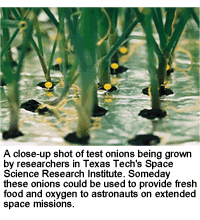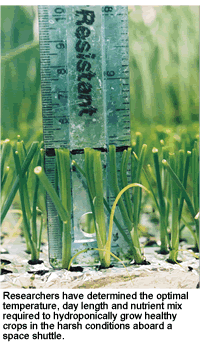Texas Tech University
Adding Some Zip To Long Space Trips - Research Could Add Flavor to Prolonged Space Travel
 Granted, enchiladas may be out of the question. But someday green onions could be on the menu for astronauts voyaging into the darkest depths of space, thanks to research at Texas Tech University.
Granted, enchiladas may be out of the question. But someday green onions could be on the menu for astronauts voyaging into the darkest depths of space, thanks to research at Texas Tech University.
Nearly one and a half years after President Bush laid out his vision to put astronauts on the moon by as early as 2015 and possibly on Mars after that, the Space Shuttle Discovery is preparing to launch this summer for the first time in two years.
And as astronauts on future missions spend increasingly longer amounts of time away from restaurants back on Earth, their need to supplement their diet with fresh foods will also increase. In addition, astronauts often struggle with elevated carbon dioxide levels on board shuttles.
The solution to both challenges, according to Texas Tech researchers, is having green plants on board. Live plants would not only help recycle oxygen, they could also provide psychological benefits and a fresh source of nutrients. But the cramped quarters and uncooperative growing conditions present hurdles.
 That�s where Texas Tech researchers come into play. The Space Science Research Institute, a collaborative effort between four university departments, has nearly perfected the art of growing onions in space.
That�s where Texas Tech researchers come into play. The Space Science Research Institute, a collaborative effort between four university departments, has nearly perfected the art of growing onions in space.
�The astronauts operate in conditions with very high CO2,� says project director Ellen Peffley, a professor of horticulture in Texas Tech�s Department of Plant and Soil Science. �We are studying the whole package of what happens under these conditions.�
So far, researchers have determined the optimal temperature, day length and nutrient mix required to hydroponically grow healthy crops in the harsh conditions aboard a shuttle. Peffley is now trying to determine the most efficient planting density to maximize the edible biomass produced.
The onions are among several space crops being studied at institutions across the country, including Kennedy Space Center.
